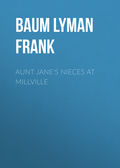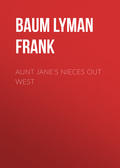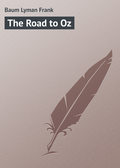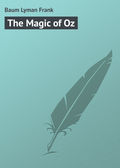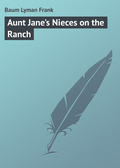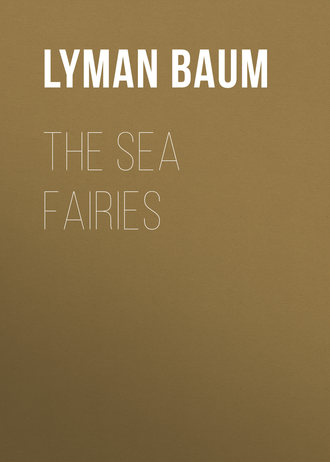
Лаймен Фрэнк Баум
The Sea Fairies
8
A Banquet Under Water
The palaces of the mermaids were all aglow with lights as they approached them, and Trot was amazed at the sight.
"Where did the lamps come from?" she asked their guide, wonderingly.
"They are not lamps, my dear," replied Merla, much amused at this suggestion; "we use electric lights in our palaces, and have done so for thousands of years – long before the earth people knew of electric lights."
"But where do you get 'em?" inquired Cap'n Bill, who was as much astonished as the girl.
"From a transparent jellyfish which naturally emits a strong and beautiful electric light," was the answer. "We have many hundreds of them in our palaces, as you will presently see."
Their way was now lighted by small phosphorescent creatures scattered about the sea gardens and which Merla informed them were hyalæa, or sea glowworms. But their light was dim when compared to that of the electric jellyfish, which they found placed in clusters upon the ceilings of all the rooms of the palaces, rendering them light as day.
Trot watched these curious creatures with delight, for delicately colored lights ran around their bodies in every direction in a continuous stream, shedding splendid rays throughout the vast halls.
A group of mermaids met the visitors in the hall of the main palace, and told Merla the queen had instructed them to show the guests to their rooms as soon as they arrived. So Trot followed two of them through several passages, after which they swam upward and entered a circular opening. There were no stairs here, because there was no need of them, and the little girl soon found herself in an upper room that was very beautiful indeed.
All the walls were covered with iridescent shells, polished till they resembled mother-of-pearl, and upon the glass ceiling were clusters of the brilliant electric jellyfish, rendering the room bright and cheerful with their radiance. In one corner stood a couch of white coral, with gossamer draperies floating around it from the four high posts. Upon examining it, the child found the couch was covered with soft, amber sponges, which rendered it very comfortable to lie upon. In a wardrobe she found several beautiful gossamer gowns, richly embroidered in colored seaweeds, and these Mayre was told she might wear while she remained the guest of the mermaids. She also found a toilet table with brushes, combs and other conveniences, all of which were made of polished tortoise-shell.
Really, the room was more dainty and comfortable than one might suppose possible in a palace far beneath the surface of the sea, and Trot was greatly delighted with her new quarters.
The mermaid attendants assisted the child to dress herself in one of the prettiest robes, which she found to be quite dry and fitted perfectly. Then the sea-maids brushed and dressed her hair, and tied it with ribbons of cherry-red seaweed. Finally they placed around her neck a string of pearls that would have been priceless upon the earth, and now the little girl announced she was ready for supper and had a good appetite.
Cap'n Bill had been given a similar room, near Trot's; but the old sailor refused to change his clothes for any others offered him, for which reason he was ready for supper long before his comrade.
"What bothers me, mate," he said to the little girl, as they swam toward the great banquet hall where Queen Aquareine awaited them, "is why we ain't crushed by the pressin' of the water agin us, bein' as we're down here in the deep sea."
"How's that, Cap'n? Why should we be crushed?" she asked.
"Why, ev'r'body knows that the deeper you go in the sea the more the water presses agin you," he explained. "Even the divers in their steel jackets can't stand it very deep down. An' here we be, miles from the top o' the water, I 'spect, an' we don't feel crowded a bit."
"I know why," answered the child, wisely. "The water don't touch us, you see. If it did, it might crush us; but it don't. It's always held a little way off from our bodies by the magic of the fairy mermaids."
"True enough, Trot," declared the sailorman. "What an idjut I was not to think o' that myself!"
In the royal banquet hall were assembled many of the mermaids, headed by the lovely queen, and as soon as their earth guests arrived Aquareine ordered the meal to be served.
The lobsters again waited upon the table, wearing little white caps and aprons which made them look very funny; but Trot was so hungry after her afternoon's excursion that she did not pay as much attention to the lobsters as she did to her supper, which was very delicious and consisted of many courses. A lobster spilled some soup on Cap'n Bill's bald head and made him yell for a minute, because it was hot and he had not expected it, but the queen apologized very sweetly for the awkwardness of her servants, and the sailor soon forgot all about the incident in his enjoyment of the meal.
After the feast ended they all went to the big reception room, where some of the mermaids played upon harps while others sang pretty songs. They danced together, too – a graceful swimming-dance, so queer to the little girl that it interested and amused her greatly.
Cap'n Bill seemed a bit bashful among so many beautiful mermaids, yet he was pleased when the queen offered him a place beside her throne, where he could see and hear all the delightful entertainment provided for the royal guests. He did not talk much, being a man of few words except when alone with Trot; but his light blue eyes were big and round with wonder at the sights he saw.
Trot and the sailorman went to bed early and slept soundly upon their sponge-covered couches. The little girl never wakened until long after the sun was shining down through the glass roof of her room, and when she opened her eyes she was startled to find a number of big, small and middle-sized fishes staring at her through the glass.
"That's one bad thing 'bout this mermaid palace," she said to herself; "it's too public. Ever'thing in the sea can look at you through the glass as much as it likes. I wouldn't mind fishes looking at me if they hadn't such big eyes, an' – goodness me! There's a monster that's all head! And there goes a fish with a sail on its back; an' here's old Mummercubble, I'm sure, for he's got a head just like a pig."
She might have watched the fishes on the roof for hours, had she not remembered it was late and breakfast must be ready. So she dressed, and made her toilet, and swam down into the palace to find Cap'n Bill and the mermaids politely waiting for her to join them.
The sea maidens were as fresh and lovely as ever, while each and all proved sweet tempered and merry, even at the breakfast table – and that is where people are cross, if they ever are. During the meal the queen said:
"I shall take you this morning to the most interesting part of the ocean, where the largest and most remarkable sea creatures live. And we must visit King Anko, too, for the sea serpent would feel hurt and slighted if I did not bring my guests to call upon him."
"That will be nice," said Trot, eagerly; but Cap'n Bill asked:
"Is there any danger, ma'am?"
"I think not," replied Queen Aquareine. "I cannot see that you will be exposed to any danger at all, so long as I am with you. But we are going into the neighborhood of some fierce and even terrible beings, which would attack you at once did they suspect you to be earth people. So, in order to guard your safety, I intend to draw the Magic Circle around both of you before we start."
"What is the Magic Circle?" asked Trot.
"A fairy charm that prevents any enemy from touching you. No monster of the sea, however powerful, will be able to reach your body while you are protected by the Magic Circle," declared the Queen.
"Oh, then, I'll not be a bit afraid," returned the child, with perfect confidence.
"Am I to have the Magic Circle drawn around me, too?" asked Cap'n Bill.
"Of course," answered Aquareine. "You will need no other protection than that, yet Princess Clia and I will both be with you. For to-day I shall leave Merla to rule our palaces in my place until we return."
No sooner was breakfast finished than Trot was anxious to start. The girl was also curious to discover what the powerful Magic Circle might prove to be, but she was a little disappointed in the ceremony. The queen merely grasped her fairy wand in her right hand and swam around the child in a circle, from left to right. Then she took her wand in her left hand and swam around Trot in another circle, from right to left.
"Now, my dear," said she, "you are safe from any creature we are liable to meet."
She performed the same ceremony for Cap'n Bill, who was doubtful about the Magic Circle, because he felt the same after it as he had before. But he said nothing of his unbelief, and soon they left the palace and started upon their journey.
9It was a lovely day, and the sea
It was a lovely day, and the sea was like azure under the rays of the sun.
Over the flower beds and through the gardens they swam, emerging into the open sea in a direction opposite that taken by the visitors the day before. The party consisted of but four: Queen Aquareine, Princess Clia, Trot and Cap'n Bill.
"People who live upon the land know only those sea creatures which they are able to catch in nets, or upon hooks, or those which become disabled and are washed ashore," remarked the Queen, as they swam swiftly through the clear water. "And those who sail in ships see only the creatures who chance to come to the surface. But, in the deep ocean caverns are queer beings, that no mortal has ever heard of or beheld, and some of these we are to visit. We shall also see some sea shrubs and flowering weeds, which are sure to delight you with their beauty."
The sights really began before they had gone very far from the palace, and a school of butterfly fish, having gorgeous colors spattered over their broad wings, was first to delight the strangers. They swam just as butterflies fly, with a darting, jerky motion, and called a merry "Good morning!" to the mermaids as they passed.
"These butterfly fish are remarkably active," said the Princess, "and their quick motions protect them from their enemies. We like to meet them; they are always so gay and good-natured."
"Why, so am I!" cried a sharp voice just beside them, and they all paused to discover what creature had spoken to them.
"Take care," said Clia, in a low voice. "It's an octopus."
Trot looked eagerly around. A long, brown arm stretched across their way in front, and another just behind them; but that did not worry her. The octopus, himself, came slowly sliding up to them, and proved to be well worth looking at.
He wore a red coat with brass buttons, and a silk hat was tipped over one ear. His eyes were somewhat dull and watery and he had a moustache of long, hair-like "feelers" that curled stiffly at the ends. When he tried to smile at them he showed two rows of sharp, white teeth. In spite of his red coat and yellow embroidered vest, his standing collar and carefully tied cravat, the legs of the octopus were bare, and Trot noticed he used some of his legs for arms, as in one of them was held a slender cane, and in another, a handkerchief.
"Well, well!" said the Octopus. "Are you all dumb? Or don't you know enough to be civil when you meet a neighbor?"
"We know how to be civil to our friends," replied Trot, who did not like the way he spoke.
"Well, aren't we friends, then?" asked the Octopus, in an airy tone of voice.
"I think not," said the little girl. "Octopuses are horrid creatures."
"Octopi, if you please; octopi" said the monster, with a laugh.
"I don't see any pie that pleases me," replied Trot, beginning to get angry.
"Octopus means one of us; two, or more are called octopi," remarked the creature, as if correcting her speech.
"I suppose a lot of you would be a whole bakery!" she said, scornfully.
"Our name is latin. It was given us by learned scientists years ago," said the Octopus.
"That's true enough," agreed Cap'n Bill. "The learned scientists named ev'ry blamed thing they come acrost, an' gener'ly they picked out names as nobody could understand, or pernounce."
"That isn't our fault, sir," said the Octopus. "Indeed, it's pretty hard for us to go through life with such terrible names. Think of the poor little sea horse. He used to be a merry and cheerful fellow, but since they named him 'hippocampus' he hasn't smiled once."
"Let's go," said Trot; "I don't like to 'sociate with octopuses."
"Octopi," said the creature, again correcting her.
"You're jus' as horrid, whether you're puses or pies," she declared.
"Horrid!" cried the monster, in a shocked tone of voice.
"Not only horrid, but horrible!" persisted the girl.
"May I ask in what way?" he inquired, and it was easy to see he was offended.
"Why, ev'rybody knows that octopuses are jus' wicked an' deceitful," she said. "Up on the earth, where I live, they call the Stannerd Oil Company an octopus, an' the Coal Trust an octopus, an' – "
"Stop, stop!" cried the monster, in a pleading voice. "Do you mean to tell me that the earth people, whom I have always respected, compare me to the Stannerd Oil Company?"
"Yes," said Trot, positively.
"That's what they do," added Cap'n Bill, nodding his grizzled head.
"Oh, what a disgrace! What a deep, direful, dreadful disgrace!" moaned the Octopus, drooping his head in shame; and Trot could see great tears rolling down his cheeks.
"This comes of having a bad name," said the Queen, gently, for she was moved by the monster's grief.
"It is unjust! It is cruel and unjust!" sobbed the creature, mournfully. "Just because we have several long arms, and take whatever we can reach, they accuse us of being like – like – oh, I cannot say it! It is too shameful – too humiliating!"
"Come; let's go," said Trot, again; so they left the poor octopus weeping and wiping his watery eyes with his handkerchief, and swam on their way.
"I'm not a bit sorry for him," remarked the child; "for his legs remind me of serpents."
"So they do me," agreed Cap'n Bill.
"But the octopi are not very bad," said the Princess, "and we get along with them much better than we do with their cousins the sea devils."
"Oh. Are the sea devils their cousins?" asked Trot.
"Yes; and they are the only creatures of the ocean which we greatly fear," replied Aquareine. "I hope we shall meet none to-day, for we are going near to the dismal caverns where they live."
"What are the sea devils like, ma'am?" inquired Cap'n Bill, a little uneasily.
"Something like the octopus you just saw, only much larger and of a bright scarlet color, striped with black," answered the Queen. "They are very fierce and terrible creatures, and nearly as much dreaded by the inhabitants of the ocean as is Zog, and nearly as powerful as King Anko himself."
"Zog! Who is Zog?" questioned the girl. "I haven't heard of him, before now."
"We do not like to mention Zog's name," responded the Queen, in a low voice. "He is the wicked genius of the sea, and a magician of great power."
"What's he like?" asked Cap'n Bill.
"He is a dreadful creature, part fish, part man, part beast and part serpent. Centuries ago they cast him off the earth into the sea, where he has caused much trouble. Once he waged a terrible war against King Anko, but the sea serpent finally conquered Zog, and drove the magician into his castle, where he now stays shut up. For if ever Anko catches the monster outside of his enchanted castle he will kill him, and Zog knows that very well."
"Seems like you have your troubles down here, just as we do on top the ground," remarked Cap'n Bill.
"But, I'm glad old Zog is shut up in his castle," added Trot. "Is it a sea castle, like your own palaces?"
"I cannot say, my dear, for the enchantment makes it invisible to all eyes but those of its inhabitants," replied Aquareine. "No one sees Zog now, and we scarcely ever hear of him; but all the sea people know he is here, some place, and fear his power. Even in the old days, before Anko conquered him, Zog was the enemy of the mermaids, as he was of all the good and respectable seafolk. But do not worry about the magician, I beg of you, for he has not dared to do an evil deed in many, many years."
"Oh, I'm not afraid," asserted Trot.
"I'm glad of that," said the Queen. "Keep together, friends, and be careful not to separate, for here comes an army of sawfishes."
Even as Aquareine spoke they saw a swirl and commotion in the water ahead of them, while a sound like a muffled roar fell upon their ears. Then swiftly there dashed upon them a group of great fishes, with long saws sticking out in front of their noses, armed with sharp hooked teeth, all set in a row. They were larger than the swordfishes and seemed more fierce and bold. But the mermaids and Trot, and Cap'n Bill quietly awaited their attack, and instead of tearing them with their saws, as they expected to do, the fishes were unable to touch them at all. They tried every possible way to get at their proposed victims, but the Magic Circle was all-powerful and turned aside the ugly saws; so our friends were not disturbed at all. Seeing this, the sawfishes soon abandoned the attempt and with growls and roars of disappointment swam away and were quickly out of sight.
Trot had been a wee bit frightened during the attack, but now she laughed gleefully and told the queen that it seemed very nice to be protected by fairy powers.
The water grew a darker blue as they descended into its depths, farther and farther away from the rays of the sun. Trot was surprised to find she could see so plainly through the high wall of water above her; but the sun was able to shoot its beams straight down through the transparent sea, and they seemed to penetrate to every nook and crevice of the rocky bottom.
In this deeper part of the ocean some of the fishes had a phosphorescent light of their own, and these could be seen far ahead, as if they were lanterns. The explorers met a school of argonauts going up to the surface for a sail, and the child watched these strange creatures with much curiosity. The argonauts live in shells, in which they are able to hide in case of danger from prowling wolf fishes; but otherwise they crawl out and carry their shells like humps upon their backs. Then they spread their skinny sails above them and sail away under water till they come to the surface, where they float and let the currents of air carry them along the same as the currents of water had done before. Trot thought the argonauts comical little creatures, with their big eyes and sharp noses, and to her they looked like a fleet of tiny ships.
It is said that men got their first idea of boats, and of how to sail them, from watching these little argonauts.
9
It was a lovely day, and the sea
It was a lovely day, and the sea was like azure under the rays of the sun.
Over the flower beds and through the gardens they swam, emerging into the open sea in a direction opposite that taken by the visitors the day before. The party consisted of but four: Queen Aquareine, Princess Clia, Trot and Cap'n Bill.
"People who live upon the land know only those sea creatures which they are able to catch in nets, or upon hooks, or those which become disabled and are washed ashore," remarked the Queen, as they swam swiftly through the clear water. "And those who sail in ships see only the creatures who chance to come to the surface. But, in the deep ocean caverns are queer beings, that no mortal has ever heard of or beheld, and some of these we are to visit. We shall also see some sea shrubs and flowering weeds, which are sure to delight you with their beauty."
The sights really began before they had gone very far from the palace, and a school of butterfly fish, having gorgeous colors spattered over their broad wings, was first to delight the strangers. They swam just as butterflies fly, with a darting, jerky motion, and called a merry "Good morning!" to the mermaids as they passed.
"These butterfly fish are remarkably active," said the Princess, "and their quick motions protect them from their enemies. We like to meet them; they are always so gay and good-natured."
"Why, so am I!" cried a sharp voice just beside them, and they all paused to discover what creature had spoken to them.
"Take care," said Clia, in a low voice. "It's an octopus."
Trot looked eagerly around. A long, brown arm stretched across their way in front, and another just behind them; but that did not worry her. The octopus, himself, came slowly sliding up to them, and proved to be well worth looking at.
He wore a red coat with brass buttons, and a silk hat was tipped over one ear. His eyes were somewhat dull and watery and he had a moustache of long, hair-like "feelers" that curled stiffly at the ends. When he tried to smile at them he showed two rows of sharp, white teeth. In spite of his red coat and yellow embroidered vest, his standing collar and carefully tied cravat, the legs of the octopus were bare, and Trot noticed he used some of his legs for arms, as in one of them was held a slender cane, and in another, a handkerchief.
"Well, well!" said the Octopus. "Are you all dumb? Or don't you know enough to be civil when you meet a neighbor?"
"We know how to be civil to our friends," replied Trot, who did not like the way he spoke.
"Well, aren't we friends, then?" asked the Octopus, in an airy tone of voice.
"I think not," said the little girl. "Octopuses are horrid creatures."
"Octopi, if you please; octopi" said the monster, with a laugh.
"I don't see any pie that pleases me," replied Trot, beginning to get angry.
"Octopus means one of us; two, or more are called octopi," remarked the creature, as if correcting her speech.
"I suppose a lot of you would be a whole bakery!" she said, scornfully.
"Our name is latin. It was given us by learned scientists years ago," said the Octopus.
"That's true enough," agreed Cap'n Bill. "The learned scientists named ev'ry blamed thing they come acrost, an' gener'ly they picked out names as nobody could understand, or pernounce."
"That isn't our fault, sir," said the Octopus. "Indeed, it's pretty hard for us to go through life with such terrible names. Think of the poor little sea horse. He used to be a merry and cheerful fellow, but since they named him 'hippocampus' he hasn't smiled once."
"Let's go," said Trot; "I don't like to 'sociate with octopuses."
"Octopi," said the creature, again correcting her.
"You're jus' as horrid, whether you're puses or pies," she declared.
"Horrid!" cried the monster, in a shocked tone of voice.
"Not only horrid, but horrible!" persisted the girl.
"May I ask in what way?" he inquired, and it was easy to see he was offended.
"Why, ev'rybody knows that octopuses are jus' wicked an' deceitful," she said. "Up on the earth, where I live, they call the Stannerd Oil Company an octopus, an' the Coal Trust an octopus, an' – "
"Stop, stop!" cried the monster, in a pleading voice. "Do you mean to tell me that the earth people, whom I have always respected, compare me to the Stannerd Oil Company?"
"Yes," said Trot, positively.
"That's what they do," added Cap'n Bill, nodding his grizzled head.
"Oh, what a disgrace! What a deep, direful, dreadful disgrace!" moaned the Octopus, drooping his head in shame; and Trot could see great tears rolling down his cheeks.
"This comes of having a bad name," said the Queen, gently, for she was moved by the monster's grief.
"It is unjust! It is cruel and unjust!" sobbed the creature, mournfully. "Just because we have several long arms, and take whatever we can reach, they accuse us of being like – like – oh, I cannot say it! It is too shameful – too humiliating!"
"Come; let's go," said Trot, again; so they left the poor octopus weeping and wiping his watery eyes with his handkerchief, and swam on their way.
"I'm not a bit sorry for him," remarked the child; "for his legs remind me of serpents."
"So they do me," agreed Cap'n Bill.
"But the octopi are not very bad," said the Princess, "and we get along with them much better than we do with their cousins the sea devils."
"Oh. Are the sea devils their cousins?" asked Trot.
"Yes; and they are the only creatures of the ocean which we greatly fear," replied Aquareine. "I hope we shall meet none to-day, for we are going near to the dismal caverns where they live."
"What are the sea devils like, ma'am?" inquired Cap'n Bill, a little uneasily.
"Something like the octopus you just saw, only much larger and of a bright scarlet color, striped with black," answered the Queen. "They are very fierce and terrible creatures, and nearly as much dreaded by the inhabitants of the ocean as is Zog, and nearly as powerful as King Anko himself."
"Zog! Who is Zog?" questioned the girl. "I haven't heard of him, before now."
"We do not like to mention Zog's name," responded the Queen, in a low voice. "He is the wicked genius of the sea, and a magician of great power."
"What's he like?" asked Cap'n Bill.
"He is a dreadful creature, part fish, part man, part beast and part serpent. Centuries ago they cast him off the earth into the sea, where he has caused much trouble. Once he waged a terrible war against King Anko, but the sea serpent finally conquered Zog, and drove the magician into his castle, where he now stays shut up. For if ever Anko catches the monster outside of his enchanted castle he will kill him, and Zog knows that very well."
"Seems like you have your troubles down here, just as we do on top the ground," remarked Cap'n Bill.
"But, I'm glad old Zog is shut up in his castle," added Trot. "Is it a sea castle, like your own palaces?"
"I cannot say, my dear, for the enchantment makes it invisible to all eyes but those of its inhabitants," replied Aquareine. "No one sees Zog now, and we scarcely ever hear of him; but all the sea people know he is here, some place, and fear his power. Even in the old days, before Anko conquered him, Zog was the enemy of the mermaids, as he was of all the good and respectable seafolk. But do not worry about the magician, I beg of you, for he has not dared to do an evil deed in many, many years."
"Oh, I'm not afraid," asserted Trot.
"I'm glad of that," said the Queen. "Keep together, friends, and be careful not to separate, for here comes an army of sawfishes."
Even as Aquareine spoke they saw a swirl and commotion in the water ahead of them, while a sound like a muffled roar fell upon their ears. Then swiftly there dashed upon them a group of great fishes, with long saws sticking out in front of their noses, armed with sharp hooked teeth, all set in a row. They were larger than the swordfishes and seemed more fierce and bold. But the mermaids and Trot, and Cap'n Bill quietly awaited their attack, and instead of tearing them with their saws, as they expected to do, the fishes were unable to touch them at all. They tried every possible way to get at their proposed victims, but the Magic Circle was all-powerful and turned aside the ugly saws; so our friends were not disturbed at all. Seeing this, the sawfishes soon abandoned the attempt and with growls and roars of disappointment swam away and were quickly out of sight.
Trot had been a wee bit frightened during the attack, but now she laughed gleefully and told the queen that it seemed very nice to be protected by fairy powers.
The water grew a darker blue as they descended into its depths, farther and farther away from the rays of the sun. Trot was surprised to find she could see so plainly through the high wall of water above her; but the sun was able to shoot its beams straight down through the transparent sea, and they seemed to penetrate to every nook and crevice of the rocky bottom.
In this deeper part of the ocean some of the fishes had a phosphorescent light of their own, and these could be seen far ahead, as if they were lanterns. The explorers met a school of argonauts going up to the surface for a sail, and the child watched these strange creatures with much curiosity. The argonauts live in shells, in which they are able to hide in case of danger from prowling wolf fishes; but otherwise they crawl out and carry their shells like humps upon their backs. Then they spread their skinny sails above them and sail away under water till they come to the surface, where they float and let the currents of air carry them along the same as the currents of water had done before. Trot thought the argonauts comical little creatures, with their big eyes and sharp noses, and to her they looked like a fleet of tiny ships.
It is said that men got their first idea of boats, and of how to sail them, from watching these little argonauts.



